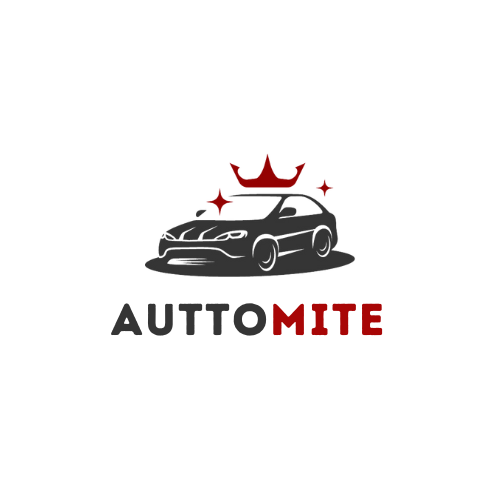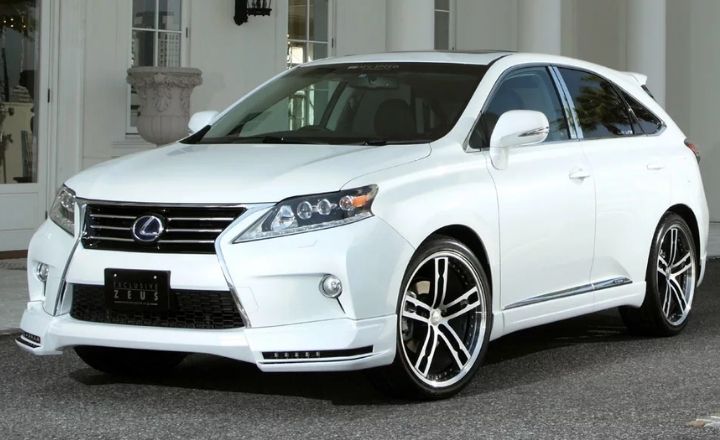The Toyota Venza has been a popular choice in the crossover SUV market since its debut in 2008, offering a blend of space, comfort, and reliability. Not all model years are created equal; the best & worst Toyota Venza years will help you navigate the sea of options when considering purchasing one.
Key factors such as performance, safety features, technological advancements, and overall design evolution over the years will show which Toyota Venza models stand out as stars or stumble as disappointments.
Toyota Venza Generations
The Toyota Venza has evolved significantly over the years, bringing innovations and enhancements to each generation.
- The first generation of the Venza debuted in 2008 as a crossover SUV with a sleek design and spacious interior.
- Toyota introduced the second generation of the Venza, focusing on updating its technology and efficiency. With improved fuel economy and updated features like advanced safety systems.
- The second-generation Venza aimed to stay competitive in an evolving market.
| Generation | Years |
| 1st generation (AV10) | 2009-2015 (AV10) |
| 2nd generation (XU80) | 2021-Present (XU80) |
Toyota Venza: Best, Neutral, and Worst Years
The Toyota Venza has been a popular crossover SUV since its debut in 2009. The best years for the Venza are 2013 and 2014, praised for their reliability, comfortable ride, and stylish design.
- These models also boast impressive fuel efficiency and a spacious interior, making them stand out.
- The neutral year for the Toyota Venza is often cited as 2015. While still a solid choice with good overall performance and features, it doesn’t quite reach the same acclaim as the best years.
- It remains a dependable option for those seeking a well-rounded crossover SUV.
- The worst year for the Toyota Venza is typically seen as 2010 due to various mechanical issues reported by owners.
- Problems with acceleration and braking systems plagued this model year, making it less favorable than its successors.
- Potential buyers should be wary of investing in a 2010 Venza unless thorough inspections have been conducted to address these concerns.
The chart consolidates all ratings to provide a clear overview of the Toyota Venza’s performance over various years.
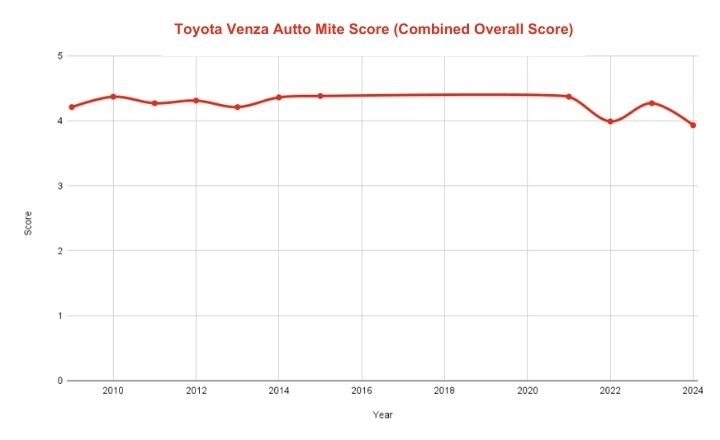
Best & Worst Toyota Venza Years For 1st Generation (2009–2015)
Toyota Venza’s 1st Generation, the prism through which we view the best and worst years, offers a compelling narrative. The year that stood out for many enthusiasts was 2013 when Toyota significantly upgraded its interior comfort and driving dynamics.
- The Best Years: 2014, 2015
- The Neutral Years: 2011, 2012, and 2013
- The Best Years: 2009, 2010
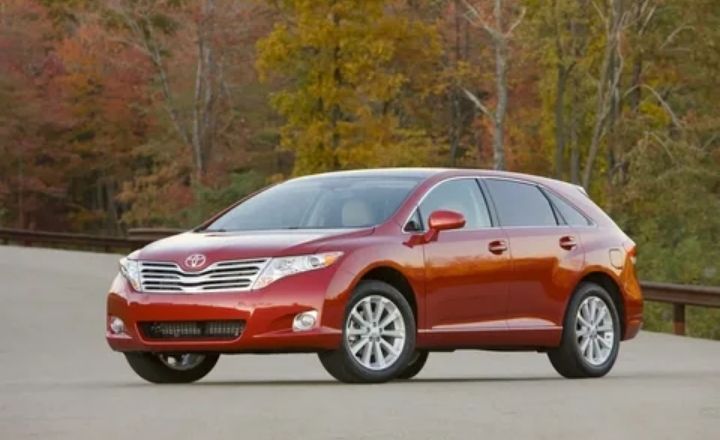
Best Years for Toyota Venza: 2014, 2015
The 2014 and 2015 Toyota Venzas are known for being reliable and feature-rich. They had two engine options: a 2.7L I4 engine with 182 hp and a 3.5L V6 engine with 268 hp.
The engines came with a 6-speed automatic transmission. The four-cylinder engine had a fuel efficiency of around 20 city and 26 highway mpg, while the V6 engine was slightly less efficient.
Safety features included electronic stability control, traction control, anti-lock brakes, and airbags. The available trim levels were LE, XLE, and Limited, each offering more luxury and technology features like heated front seats, a panoramic sunroof, and a premium JBL sound system.
This model year not only featured sleek design improvements but also introduced advanced tech features that set a new benchmark in the crossover market segment.
The Neutral Years: 2011, 2012, 2013
The 2011, 2012, and 2013 Toyota Venza models are reliable but not as fancy as newer ones. They have the same power options as the best years, so they work fine.
In 2011, Venza had problems with heated seats and brakes. The 2012 and 2013 models were part of a recall for airbag issues caused by water leaks, which could make the airbags go off by mistake. These years are decent on gas and have safety features but lack the fancy extras of newer models.
The consensus leans towards identifying 2011 as one of the more challenging years for Toyota Venza owners. Indicate various issues around reliability and performance concerns during this period.
The Worst Years: 2009, 2010
The Toyota Venza years to avoid are 2009 and 2010. These models had issues with the electrical system, powertrain, and brakes, leading to recalls.
Problems included leaking sunroofs, transmission glitches, unintended acceleration, and faulty speed sensors. There were significant recalls for stuck acceleration pedals and brake light failures, which were safety concerns.
The early models lacked the improvements seen in the later models, making them less appealing to buyers. More information can be found on the NHTSA website regarding recalls and complaints for the 2009 and 2010 Toyota Venza models.
Best & Worst Years for Toyota Venza 2nd Generation (2021-2024)
The Toyota Venza came back in 2021 as a mid-size SUV with two rows of seats. This new version is about hybrid technology, showing Toyota’s dedication to eco-friendly cars. The 2021 model is the worst of the second generation, with the best years being from 2022 onwards.
- The Best Years: 2022, 2023, and 2024
- The Best Years: 2021
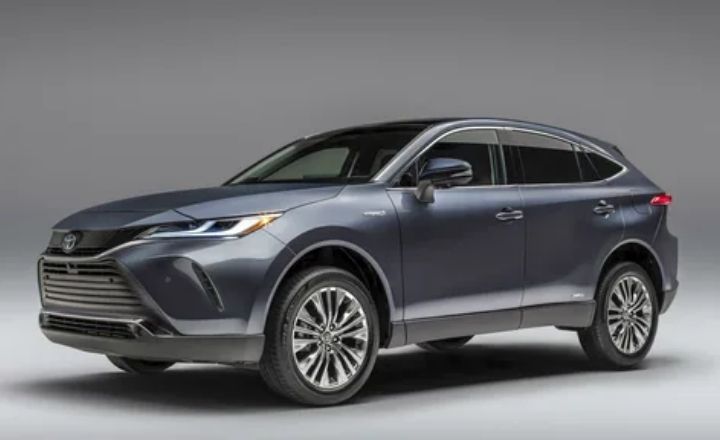
Best years for Toyota Venza: 2022, 2023, and 2024
The 2022, 2023, and 2024 Toyota Venza models are the most reliable in the second generation. They have improved technology and reliability.
These models have a 2.5L A25A-FXS I4 engine with three electric motors, giving 219 hp. They also have an electronically controlled continuously variable transmission (eCVT) for better fuel efficiency and performance.
The fuel economy is impressive, averaging around 40 city and 37 highway mpg. Safety features include the Toyota Avalon Safety Sense 2.5, a pre-collision system, lane departure alert, and radar cruise control.
The Venza comes in LE, XLE, and Limited trims, each with luxury features like a 12.3-inch touchscreen, JBL audio, and a panoramic roof. It is the best year to buy a Toyota Venza.
The Worst Years: 2021
The 2021 Toyota Venza had some problems when it first came out. Many owners had cracked windshields, which led to a lawsuit. There was also a recall for stability control issues that could affect how the car handles.
The 2021 Venza still had a hybrid engine and advanced safety features like newer models. Early problems may not be the best choice compared to later versions.
Toyota Venza Resale Values
With the Toyota Venza resale values, one cannot ignore the consistent performance of this popular crossover SUV in the secondary market. With its sleek design, fuel efficiency, and reliable Toyota engineering, the Venza holds its value remarkably well over time
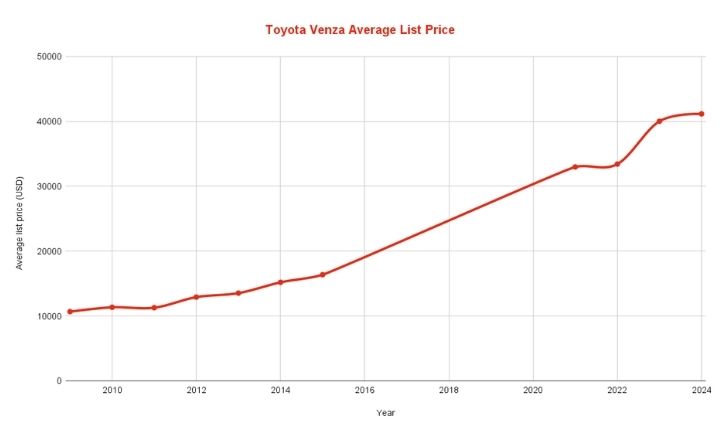
Conclusion,
The Toyota had its highs and lows over the years, with the best & worst Toyota Venza years standing out as more reliable and efficient than others. While the 2009 and 2013 models have been noted for their strong performance and features, the 2010 and 2014 models have been criticized for certain issues.
It is crucial for prospective buyers to thoroughly research and test drive different model years to determine which one suits their needs best. Choosing a Toyota Venza that aligns with your preferences and requirements will ensure a satisfying driving experience for years.
FAQ’s
Which year of the Toyota Venza has the most reliable engine?
The 2009 Toyota Venza is known for having a reliable engine with few reported issues.
